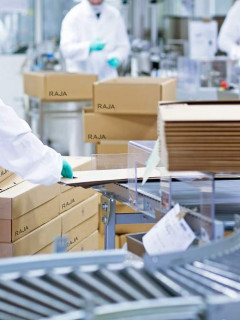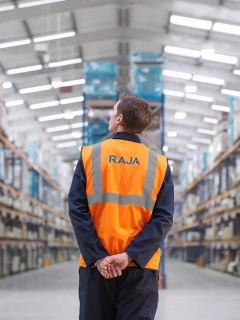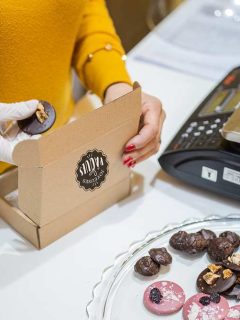Customers are asking for it, service providers are taking it into account and the planet is demanding it: it is now essential to rethink our processes and practices in relation to our carbon footprint.

For some inspiration, we interviewed Thibault Rebattu, deputy CEO of e-commerce company Greenweez, who shares with us the progress they have made in reducing their carbon footprint, and his vision of the future of e-commerce from an environmental perspective.
To begin with, tell us a bit about Greenweez..
Greenweez was founded 11 years ago, in 2008, directly on Lake Annecy, in a natural and green setting, between the mountains… A place that carries the promise of ecology, and that makes you want to fight to preserve the environment!
The founders were true visionaries: they were forerunners, both in organic and in e-commerce, which were less marked characteristics of the company than they are today.
Greenweez began by distributing ecological cleaning and hygiene products, but as customers were asking for a lot of food products, we developed this offer. We are now the leaders in online organic products in France and in Europe.

In addition to your products, you are also involved in many ecological actions..
We work with associations but also with schools, where we make young people aware of good ecological practices. We also communicate a lot on social networks, to evangelise to as many people as possible about respect for the environment, organic food, zero waste…
Where does this interest in ecology come from?
At Greenweez, we realised very early on the ecological urgency, and our vocation was to make organic products accessible to all. Access to these products could not remain the prerogative of a fraction of the population with high means. We had to democratise organic products, by proposing a large offer at the right price
And from a personal point of view… I joined Greenweez a few years ago, and I’m delighted to be able to align my everyday values with those of my company. It’s a great challenge, which allows us to give our all: the more we develop, the better it is for the planet!
From a logistical point of view, what has been Greenweez’s path to reducing its carbon footprint?
We have always wanted to reduce our carbon footprint as much as possible.
However, in 2008, e-business was not yet at the stage of ecological reflection where it is now.
It has really been 2 years since we have felt an evolution in the perception of logistics providers:
- Transporters are making massive investments in green vehicle fleets
- Cardboard manufacturers are developing alternatives to their plastic products
It is therefore easier to choose more environmentally friendly materials..
We have always tried to find the right partners to accompany us, people who share this ecological DNA with us
We are faced with increasingly proactive players who want to participate in reducing the carbon footprint of their customers.
What challenges have you encountered in this adventure of green e-commerce logistics?
A challenge comes to mind: that of the food e-commerce players, who offer a varied range of products that require quite a lot of logistical engineering. Our range of products goes from the small, very fragile packet of crisps to Kombucha, from children’s games to household products
The big challenge is to have the smallest possible carbon footprint, particularly in terms of packaging and cushioning, while limiting the level of breakage as much as possible. We take a pragmatic approach to managing the equation of protecting goods versus the carbon footprint.
What solution have you found to reduce the carbon footprint of your cushioning?
We’ve been working with RAJA for several years now; they know our issues and needs well, so as soon as the WrapPack Protector product came out, they came to us, and we put the first machines in place very quickly.
This solution has enabled us to reduce our plastic emissions by 70-75%, which is a great achievement.
What impact has this new solution had on your order picking?
The impact has been significant, in the sense that today we no longer have a single standard packing process that would save us time. Each type of order has its own process. But we still choose to be more eco-responsible, even if it means increasing preparation time.
And the WrapPack Protector machine is still very easy to use: we have trained our pickers very easily to use the tool, and each picking station now has one.

What are your prospects for the coming years in terms of eco-responsibility?
The DNA of Greenweez is to be “committed, not perfect”. We don’t want to be moralistic about the environment, we want to remain positive and involve as many people as possible in this challenge
We are continuing our efforts internally:
- We are aiming for 100% plastic-free very quickly; for this, we need the cardboard manufacturers to continue to offer innovative solutions.
- We want to continue our work on reusable cardboard. For the 2019 festive season, we have already launched Christmas trees that can be cut out and coloured. We are currently working on the design of dominoes made from recycled cardboard.
- We want to work with a fleet of Green carriers – this is the major carbon footprint of e-commerce, and we need to find solutions to combat it.
All these challenges are very positive ones to take up, and we’re going to get there!

How do you see the future of e-commerce in terms of eco-responsibility?
While reducing our carbon footprint is part of our corporate culture at Greenweez, this is not necessarily the case for a number of e-tailers
However, this notion of eco-responsibility is now entering the DNA of the customers. Now, the customers have the power: we feel that they will force the e-tailers to adopt this environmental responsibility. If they ask for it, they will inevitably get it
Thank you to Thibault Rebattu for taking the time for this interview, which makes you want to go further in eco-responsibility.















